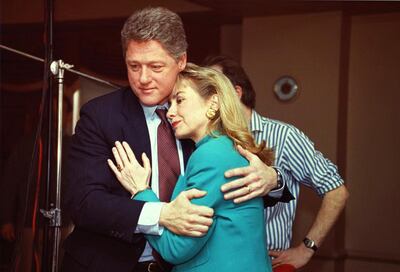In the build-up to the 2006 US mid-term elections, which global media coverage at the time suggested would be a referendum on George W Bush's poor handling of the war in Iraq, I found myself in Las Vegas listening to his predecessor Bill Clinton address a Democratic Party campaign rally.
Mr Clinton was in Las Vegas to endorse a candidate and his speech focused on issues close to home such as local propositions being voted on. Iraq wasn’t mentioned once. Given the context, this is perhaps understandable but I found it surprising given all I had heard and seen in the preceding weeks on TV about what voters in America supposedly cared most about.
The Democrats were subsequently very successful in those elections, winning control of both houses of Congress. From outside the country, the pre-election narrative about the dissatisfaction over the Iraq war was seemingly confirmed. I remained unconvinced. It appeared more likely that Democrats struck the right chords with voters on the local issues that would impact their day-to-day lives far more immediately than whether a foreign conflict was being mishandled thousands of kilometres away.

My experience in 2006 showed me that you could never be too certain about what could be dominating the minds of US voters from such a distance away as the UAE. It also taught me to try to look past the media noise at the national and international level.
In the 2020 presidential election, so far much of the coverage has been about the coronavirus and President Donald Trump's response to the pandemic as the number of new cases in the US continues to rise. Covid-19 has wreaked havoc on the normal course of work and commerce. Millions of jobs have been lost and many people have been pushed into poverty in America. Many more are at risk of going hungry.
While Mr Trump has repeatedly touted what he believes to be a strong performance by his administration during his term in office, his Democratic rival Joe Biden has argued that worsening economic conditions are a direct result of his approach to the coronavirus. There have been more than 9.3 million recorded cases of infection in the US. While some 6 million have recovered, there have been more than 235,000 deaths.
It is a sorry story. One that has been given immense international media coverage, including of the many controversial comments and actions taken by Mr Trump – in the process himself becoming one of the millions infected and recovered. However, the coronavirus and the handling of the pandemic is not the most important matter for voters ahead of Tuesday's election, according to some opinion polls.

The economy is the No 1 issue for Americans, according to a survey by Pew Research Centre in October. The economy is well ahead of other issues such as health care and Supreme Court appointments, which in turn take precedence over Covid-19.
Democrats seem to have decided that the economy is so important to voters that they are angry enough about the effect of the pandemic to vote out their Republican rivals, including Mr Trump. Superficially, this makes sense. Massive job losses and slower business activity in the months since March should dent, in the minds of voters, Mr Trump’s claims of how well the economy is doing.
The data, however, undermines this argument. The country's economic performance in the third quarter was robust thanks to $2 trillion in stimulus spending passed by Congress in March. This momentum will eventually peter out without further fiscal support, but Mr Trump promises he will deliver more if he wins. But even before the pandemic, many Americans have been benefitting and saving from Mr Trump's tax cuts for more than two years now. Largely, they banked rather than spent the money too.

Combined with stimulus cheques and higher than usual unemployment benefits during the pandemic, that has put money in their pockets over the summer. So, Americans may not be immediately feeling as if the economy is doing as badly as the Democrats – and the media coverage – say it is. They may ultimately reward Mr Trump for the performance of the past few months rather than punish him for a disaster that may only come to pass in the months ahead.
Not everyone in America sees Mr Trump’s time in office on the same terms as his opponents. Most will, of course, acknowledge the mistakes and the damage his administration has wrought at times. Yet each voter has the considerable weight of their own personal circumstances to factor into their decision on who to vote for. Added to that is the fact that we are going through the most uncertain period in a generation. Voters are being asked to balance what they cannot know with what they do not yet know. It is too much to ask.

We should begin to accept the idea that, with a significant proportion of American voters doing OK in terms of their personal finances, they would be unlikely to vote for an additional change of circumstances.
Going back once again to Mr Clinton; in 1992, during a campaign that saw him beat incumbent George HW Bush to win the White House, Mr Clinton’s strategist James Carville famously adopted the mantra of “it’s the economy, stupid”. In 2020, this phrase may bear repeating and I worry that we may all feel a little foolish come Wednesday, once the outcome of the election begins to emerge.
Mustafa Alrawi is an assistant editor-in-chief at The National

